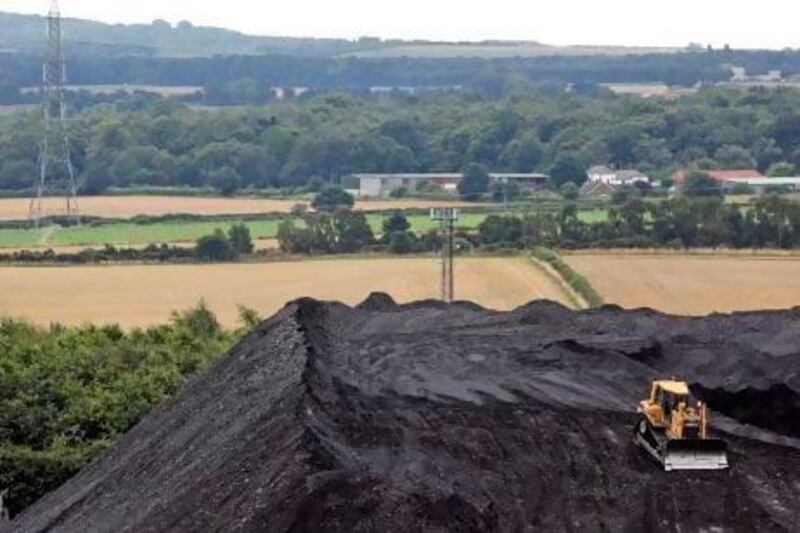In the end, the final humiliation of the United Kingdom's once-great mining industry came suddenly.
It was a fire at Daw Mill colliery in February that drew a line under the struggling industry's hopes to rediscover its former glory.
Last week, as fine weather shone on the British Isles and the public enjoyed a long-awaited summer to cheer, "Old King Coal" was quietly given the last rites as UK Coal, the country's last remaining large coal miner, was put into administration, a form of bankruptcy protection under British law.
UK Coal owned eight pits and employed 2,350 workers.
Despite a turbulent financial history, UK Coal still supplied 6 per cent of the UK's electricity by providing coal for Drax, the UK's biggest power station in North Yorkshire and three other power stations in Nottinghamshire. While coal is not a favoured fuel in the UK's long-term energy strategy, it is essential for the short-term energy security of the country.
"High fixed costs and a two-week cash conversion cycle, the time taken between mining the coal and our being paid for it, means that when something operational goes wrong, it has an immediate impact on our financial situation," the chairman, Jonson Cox, said last year, describing his company's problems.
"That is compounded by our pension deficit, which now stands at £430 million [Dh2.3m] and £80m worth of debt owed to customers and the banks."
Unfortunately, Mr Cox's words proved prescient despite him putting in place a restructuring plan in December, which was to divide the business into a property company effectively owned by the pension fund, and a mining subsidiary.
However, the fire that swept through Daw Mill in Warwickshire in February, the company's most profitable and largest pit, was the last straw and meant a second restructuring was necessary.
This time, the company's two remaining deep mines and six surface mines will transfer to a new holding company, UK Coal Production, which will be controlled by the state-sponsored pension lifeboat scheme known as the Pension Protection Fund (PPF).
The PPF will control UK Coal through secure loans, while the equity in the company will go to an employee benefit trust. UK Coal will make payments into the PPF that should exceed its loans.
The deal is the biggest rescue the PPF has ever undertaken and means the fund is now effectively a mining company.
On the plus side, the restructuring, which was aided and encouraged by the government, will secure 2,000 jobs. However, 350 jobs have been lost and some deferred pensioners - those who have left the company but have not yet retired - will suffer significant cuts to the payouts they can expect.
"This is the best outcome that it was possible to achieve," says Kevin McCullough, the chief executive of UK Coal.
"Entering administration and the subsequent restructuring was the only way we could preserve any of the business and, while I am delighted we have saved 2,000 jobs, we have also had to make some very difficult decisions.
"It means that this country can still produce coal on a reasonable scale. It may be a small industry but, when 40 per cent of our energy still comes from coal, it makes absolute sense to use as much British coal as possible to help keep energy bills from being even higher."
Now Daw Mill, the UK's deepest mine, will pass to the government-owned Coal Authority, which will shut the mine down safely. Its passing is keenly felt in Warwickshire, particularly since the business appeared to be performing well only the previous year.
Daw Mill dug 800,000 tonnes from the ground in the first half of last year, equal to about a quarter of UK Coal's total output.
But the type of fire that occurred at Daw Mill - the biggest underground blaze in the UK for at least 30 years and caused by spontaneous combustion at the coal face - usually spells closure for a pit.
During its heyday in the 1930s, the colliery was the biggest of the Warwickshire pits and at its height employed more than 2,400 miners.
Just four years ago, Daw Mill was producing nearly half the country's coal and in 2009, it was rated the most productive and technologically advanced mine in Europe. However, the company had been threatening to close the pit from next year because of a failure to agree to new pay and conditions with the workforce.
International coal prices have been falling this year - reaching a five-year low last month - because of competition from European producers and falling demand from China. Over the medium to long term, European coal prices are expected to remain low as demand falls further, when older power stations are closed down under stricter environmental rules.
A report by the consultants Wood Mackenzie published in March said the current upturn in European coal demand was unlikely to be sustained as EU environmental policies weaken the role of coal in the European energy mix beyond 2020.
In the short term, however, coal's increased role in the UK energy mix has taken the sector by surprise and alarmed ministers and environmentalists. It has increasingly become the fuel of choice for UK power producers as profit margins at gas-fired power stations have come under pressure.
Long term, however, there is no doubting the decline in the industry. The UK has lost more than 1,000 pits since 1947, when they employed about 750,000 people.
It was an industry that defined Britain for generations - one of the country's main sources of national wealth. But mining is now so remote from most people that the fire at Daw Mill was scarcely mentioned in the mainstream media.
Meanwhile, UK Coal's passage into administration was more noteworthy because of its impact on the PPF than as another nail in the coffin of Old King Coal.





